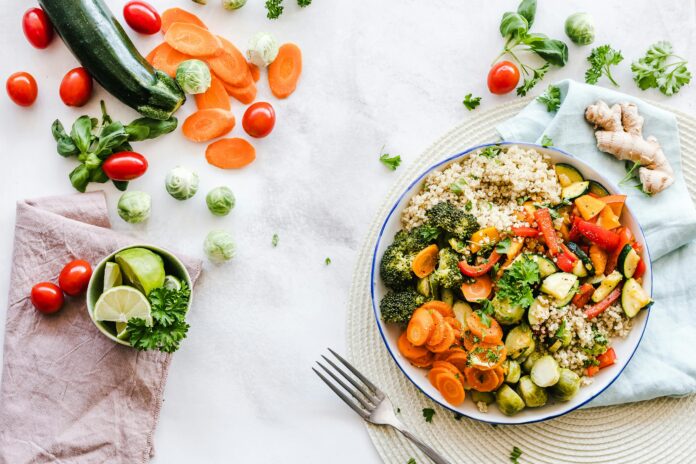Description: Discover an effective diet to lower cholesterol and blood pressure, featuring foods to lower blood pressure and cholesterol naturally. Learn about the Ayurvedic way to reduce cholesterol and maintain a healthy lifestyle.
Problem Covered:
- Diet to lower cholesterol and blood pressure
- Foods to lower blood pressure and cholesterol
- Diet for high cholesterol and high blood pressure
- Diet to lower cholesterol and high blood pressure
- Low cholesterol blood pressure diet
- Ayurvedic way to reduce cholesterol

When it comes to our health, diet plays a crucial role in managing conditions like high cholesterol and high blood pressure. You might ask, “How can I eat my way to better health?” Well, the answer lies in making informed food choices that support your cardiovascular system. Let’s dive into the world of heart-healthy eating and discover the best diet to lower cholesterol and blood pressure.
Table of Contents
Understanding Cholesterol and Blood Pressure
Before diving into the diet specifics, it’s important to understand what cholesterol and blood pressure are, and why managing them is vital for your health.
Cholesterol is a fatty substance found in your blood. While your body needs cholesterol to build healthy cells, high levels can increase your risk of heart disease.
Blood pressure measures the force of blood pushing against the walls of your arteries. High blood pressure (hypertension) can lead to serious health issues like heart attack and stroke. Keeping these two in check is essential for a long and healthy life.
Importance of Diet in Managing Health
A balanced diet isn’t just about keeping your waistline in check. It plays a pivotal role in managing and preventing health conditions, including high cholesterol and high blood pressure. Eating the right foods can help reduce these risks, making your heart healthier and your life longer.
Foods to Lower Blood Pressure and Cholesterol
What you eat significantly impacts your cholesterol and blood pressure levels. Here are some heart-healthy foods to lower blood pressure and cholesterol:
- Oats and Whole Grains: Rich in soluble fiber, they help reduce bad cholesterol (LDL). Try Quaker Oats available on Amazon.
- Leafy Greens: High in potassium, which helps manage blood pressure. Consider adding organic kale to your diet, such as Simple Truth Organic available on Amazon.
- Berries: Packed with antioxidants, they improve heart health. Frozen blueberries are a great choice, such as Wyman’s Wild Blueberries available on Amazon.
- Fatty Fish: Rich in omega-3 fatty acids, they reduce blood pressure and cholesterol. Wild-caught Alaskan salmon is an excellent option, like Wild Planet Salmon available on Amazon.
- Nuts: Provide healthy fats that help lower cholesterol. Raw almonds are particularly good, such as Blue Diamond Almonds available on Amazon.
40 Foods to Lower Cholesterol
To give you a comprehensive guide, here are 40 foods that lower cholesterol:
- Oats
- Barley
- Apples
- Grapes
- Strawberries
- Citrus fruits
- Soy
- Beans
- Eggplant
- Okra
- Nuts
- Vegetable oils
- Fatty fish
- Avocados
- Apples
- Citrus fruits
- Blueberries
- Blackberries
- Raspberries
- Spinach
- Kale
- Broccoli
- Brussels sprouts
- Carrots
- Sweet potatoes
- Legumes
- Seeds
- Green tea
- Dark chocolate
- Red wine (in moderation)
- Garlic
- Ginger
- Turmeric
- Flaxseeds
- Chia seeds
- Tomatoes
- Almonds
- Walnuts
- Pistachios
- Peanuts
The DASH Diet
The Dietary Approaches to Stop Hypertension (DASH) is specifically designed to combat high blood pressure. It emphasizes:
- Fruits and Vegetables: Aim for 4-5 servings each per day.
- Whole Grains: Include 6-8 servings daily.
- Lean Proteins: Focus on fish, poultry, and beans.
- Low-Fat Dairy: Consume 2-3 servings per day.
- Nuts and Seeds: A few servings per week.
The DASH diet is not only great for lowering blood pressure but also beneficial for cholesterol management. For a comprehensive guide, consider the book “The DASH Diet Health Plan” available on Amazon.
The Mediterranean Diet
The Mediterranean Diet is inspired by the eating habits of countries bordering the Mediterranean Sea. It includes:
- Olive Oil: Use as the primary fat source. Extra virgin olive oil is the best choice, such as Colavita Extra Virgin Olive Oil available on Amazon.
- Fruits and Vegetables: Eat plenty every day.
- Whole Grains: Opt for whole-grain bread, pasta, and cereals.
- Fish and Poultry: Consume at least twice a week.
- Legumes and Nuts: Regularly include in meals.
This diet is celebrated for its heart-healthy benefits, making it an excellent choice for those looking to lower cholesterol and blood pressure.
Plant-Based Diets
Shifting towards a plant-based diet can significantly impact your heart health. Plant-based diets emphasize:
- Vegetables and Fruits: Rich in essential nutrients and fiber.
- Legumes: Beans, lentils, and peas are great protein sources.
- Whole Grains: Brown rice, quinoa, and barley support cardiovascular health.
- Nuts and Seeds: Provide healthy fats and proteins.
Plant-based diets are not only effective for weight management but also for reducing cholesterol and blood pressure. Consider the book “The Plant-Based Diet for Beginners” available on Amazon.
The Role of Fiber
Dietary fiber is crucial in managing cholesterol and blood pressure. There are two types:
- Soluble Fiber: Found in oats, fruits, and legumes, it helps lower LDL cholesterol.
- Insoluble Fiber: Found in whole grains and vegetables, it aids in digestion.
Aim for a daily intake of 25-30 grams of fiber to reap the heart health benefits. Psyllium husk is a great fiber supplement, like Metamucil available on Amazon.
Healthy Fats vs. Unhealthy Fats
Not all fats are created equal. Understanding the difference can make a big impact on your heart health.
- Healthy Fats: Include unsaturated fats found in olive oil, avocados, and nuts. These fats can help lower bad cholesterol levels.
- Unhealthy Fats: Saturated and trans fats found in processed foods and red meats can raise cholesterol levels. Limit their intake for better heart health.
For healthy cooking, consider using Olive Ranch Extra Virgin Olive Oil available on Amazon.
Reducing Sodium Intake
High sodium intake is directly linked to elevated blood pressure. Reducing sodium can have immediate and long-term benefits. Tips to reduce sodium include:
- Cook at Home: Control the amount of salt used in meals.
- Read Labels: Choose low-sodium or no-sodium-added products.
- Flavor with Herbs: Use herbs and spices instead of salt for seasoning. Mrs. Dash Salt-Free Seasoning Blend is a great option available on Amazon.
The Power of Antioxidants
Antioxidants protect your cells from damage and are vital for heart health. Foods rich in antioxidants include:
- Berries: Blueberries, strawberries, and raspberries.
- Green Tea: Rich in catechins, which have heart-protective benefits. Try Matcha Green Tea Powder available on Amazon.
- Dark Chocolate: Contains flavonoids that improve heart health. Opt for chocolate with at least 70% cocoa, like Ghirardelli Intense Dark Chocolate available on Amazon.
Ayurvedic Way to Reduce Cholesterol
Ayurveda offers natural ways to maintain heart health. Some effective Ayurvedic tips include:
- Garlic: Known for its cholesterol-lowering properties. Aged garlic extract supplements can be found on Amazon, like Kyolic Aged Garlic Extract available on Amazon.
- Turmeric: Contains curcumin, which helps reduce inflammation and cholesterol levels. Organic Turmeric Powder is a great choice available on Amazon.
- Guggul: An herbal remedy that supports cholesterol management. Guggul supplements are available, like Nutriherbs Guggul available on Amazon.
Lifestyle Changes Beyond Diet
Besides diet, lifestyle changes can significantly impact cholesterol and blood pressure levels. Consider incorporating these habits:
- Exercise Regularly: Aim for at least 150 minutes of moderate aerobic activity or 75 minutes of vigorous activity each week.
- Maintain a Healthy Weight: Losing even a small amount of weight can improve cholesterol and blood pressure.
- Quit Smoking: Smoking cessation improves heart health almost immediately.
- Limit Alcohol: Moderate alcohol consumption can be beneficial, but excessive drinking raises cholesterol and blood pressure.
Practical Tips for a Low Cholesterol Diet
Here are some practical tips to help you maintain a low cholesterol diet:
- Plan Meals Ahead: Prepare a weekly meal plan focusing on heart-healthy foods.
- Read Labels: Always check food labels for cholesterol, saturated fat, and sodium content.
- Cook at Home: This way, you have full control over the ingredients and cooking methods.
- Choose Healthy Snacks: Opt for fruits, nuts, and whole-grain snacks instead of processed foods.
- Stay Hydrated: Drink plenty of water and avoid sugary drinks.
Conclusion
Managing cholesterol and blood pressure through diet is a practical and effective approach to improving your heart health. By incorporating a variety of heart-healthy foods and making mindful lifestyle changes, you can take significant steps towards a healthier future.
FAQs
1. What foods should I avoid if I have high cholesterol?
Avoid foods high in saturated and trans fats such as red meat, processed meats, fried foods, and full-fat dairy products. These can raise bad cholesterol levels.
2. How can fiber help lower cholesterol?
Soluble fiber binds to cholesterol in the digestive system and helps remove it from the body. Foods like oats, beans, and fruits are high in soluble fiber.
3. Are there any supplements that can help lower cholesterol?
Supplements like omega-3 fatty acids, niacin, and plant sterols can support heart health. However, it’s important to consult with a healthcare provider before starting any supplement regimen.
4. How does stress affect cholesterol and blood pressure?
Stress can negatively impact your heart health by increasing cholesterol and blood pressure levels. Managing stress through relaxation techniques, such as yoga and meditation, can be beneficial.
5. What is the role of antioxidants in heart health?
Antioxidants protect your cells from damage. Foods rich in antioxidants, like berries and green tea, can support your cardiovascular system and improve heart health.
By understanding and implementing these dietary and lifestyle changes, you can take control of your heart health and work towards lowering cholesterol and blood pressure naturally.





